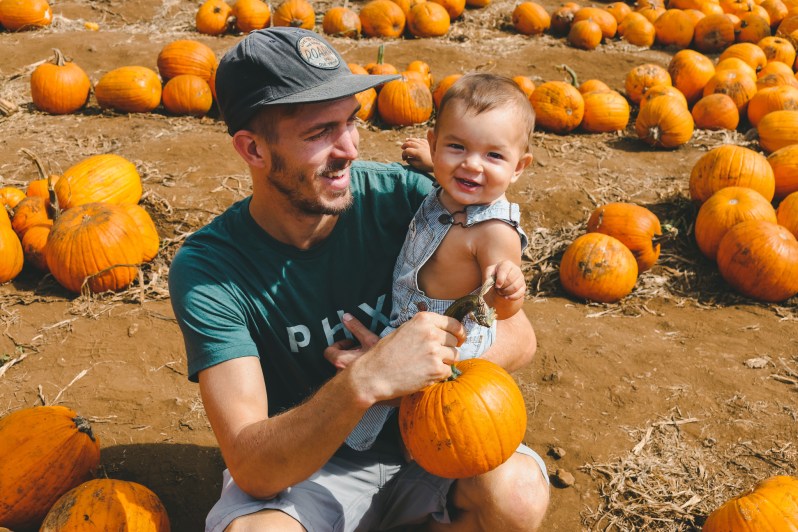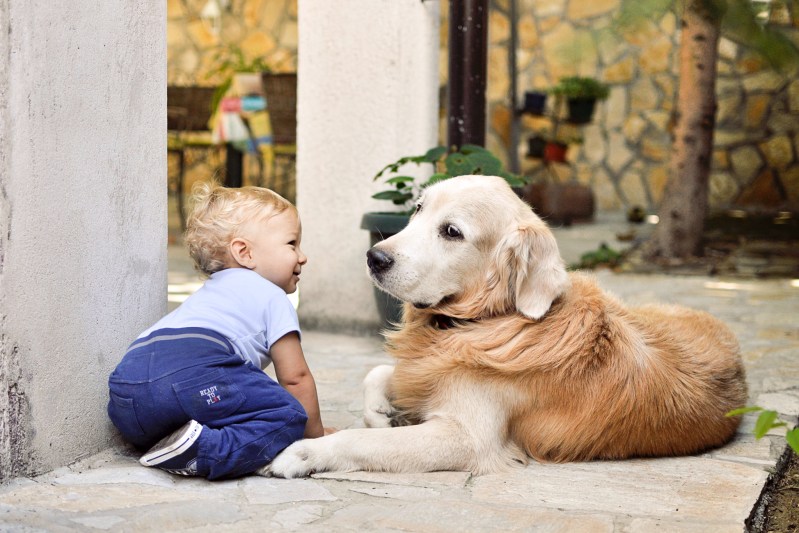So your best friend just had a baby. It’s an understatement to say his life has changed. But whether you’ve acknowledged it or not, yours has, too. As close as you and your bro have always been, your relationship has suddenly been driven apart by a bald, 8-pound bundle of joy. And tears. And diapers.
No longer can you meet up for early morning workouts or after-work drinks. Your joke texts are going unanswered, and he’s a no-show at your weekly pick-up basketball games. As for weekend pub crawls and endless dart games in your garage, his opt-out status seems all but guaranteed.
With all these changes, it’s natural to wonder where your friendship fits in. Or if it does at all.

If you don’t have kids yourself, it can be hard to know how to relate to your buddy at this point in his life. Does he want to hear from you, or would you just be annoying him? Are you allowed to acknowledge the sleep-deprived craziness in his eyes, or should you just keep quiet? Is he expecting you to ask for pictures of his new rugrat, or even (gulp!) babysit?
If you’re like a lot of guys, you’re very unlikely to ask him directly about this … just as he’s unlikely to reach out to you if he’s feeling lonely or in need of some support. This is really a shame, since 1 in 10 new dads experience postpartum depression, anxiety, or other mood disorders in the weeks following their child’s birth. (Some estimates are as high as 1 in 4.) But given the general stigma around mental healthcare for men, and the exclusive focus around women after childbirth, it’s statistically unlikely that anybody is going to check up on how your pal is feeling and functioning in his new role.
That means it’s up to you to do it.
New parenthood can either be a time for friendships to fizzle or for ascending to a new level. Like trench warfare or chronic physical illness, this milestone in your friend’s life is accompanied by rollercoaster emotions at best, a significant existential crisis at worst. As tempting as it can be to keep your distance until the struggle subsides, coming alongside your friend at this moment could be the most important gesture you’ve ever made in your friendship.
You don’t have to hold his hand or urge him to share his feelings (though if he does express them, you’d sure as shit better listen). There are plenty of practical ways you can support your friend in his new role while helping him work his way back toward being his “old self” again. While he’ll never be exactly the same person as he was pre-fatherhood, offering your friend support in this crucial time will make you tighter than ever.
Change your mindset
Supporting your friend during the early days and weeks of his baby’s life starts with shifting how you think of him. It might sound like a stretch, but the reality is that your friend is experiencing a form of PTSD. Even if his birthing experience was smooth and his child and partner are healthy and doing great, your friend has been through a life-changing experience that he probably hasn’t fully processed yet. Add in the wildly swinging mood in his home, the rhythms of newborn life that he’s still adjusting to, and the frequent sound of crying that he’s trying to interpret, and you get the idea: your buddy is in the shit right now. Just keeping that in mind will help you navigate your relationship with the empathy he needs.

Cut him some slack
If your buddy seems a lot slower to pick up on a joke these days, there’s a good reason. The pressures of adjusting to life with an infant, coupled with a scandalous lack of sleep, can take a real toll on a person’s sense of humor. Same goes for things like remembering appointments and special occasions, or just about any mental function that goes past basic survival. The best thing you can do is maintain your usual dynamic as much as possible while taking it easy on him when he says “I don’t get it” or “What are you talking about?”
Bring him food
Speaking as a new-ish parent myself, I can say that being housebound with a newborn makes you desperate for novelty of any kind. On top of that, tending to the constant needs of your baby often prevents you from getting the nourishment you need. This double desperation can be cured with one simple favor: a takeout order from your friend’s favorite place, picked up and hand-delivered by someone who won’t bat an eye at your three-day bedhead and untidy house. Don’t even ask him what he wants — just text him after you’ve placed the order and let him know when you’ll be dropping by. Just be prepared for unwonted displays of gratitude — in the early days of my son’s life, I nearly burst into tears the time my friend came over with burritos, posole, and an extra-large tub of guacamole from my favorite Mexican restaurant.
Don’t give up on hangouts
While your buddy probably can’t leave the house at a drop of a hat anymore, he still can (and desperately wants) to hang out. Finding ways to hang out that accommodate his new lifestyle will mean the world to him. This might mean coming over to watch a game or a movie while he feeds and rocks the baby, meeting up for a walk or a bike ride with baby in tow, or reconfiguring your schedule so you can hang out one-on-one during his rare moments away from baby and mommy. Once his kid gets to the 6-month age range, he’ll welcome the chance to come hang out at your place — even with the baby, just getting out of the house will feel like a vacation. (Bonus points if you have a pet that baby can play with.)

“My brother in law joins us at the playground and has us over to play with his dog regularly. It’s a nice change of pace.” —Mike H., New York
Note that in this scenario, it’s on you to keep your expectations flexible. Your hangout might start off great, but then get derailed by a crying jag, a nap gone wrong, or a literal shit storm. If this happens, play it cool, and don’t give up inviting him to hang out. Regardless of how much time you actually get to spend together, the invitation will feel like major support to your friend.
Contribute your skills
It’s perfectly understandable that you don’t want to babysit a newborn. (Honestly, the baby’s parents probably don’t want you to, either.) But there are plenty of other ways you can lighten your friend’s load. Take his trash and recycling out, get his car washed and detailed, walk his dog, mow his lawn, pick up some groceries for him (or get them delivered) … in short, any basic life stuff that he’s currently neglecting while tending to his new baby. What takes just an hour of your time will mean the world to him. (It’s also a great way to score brownie points with his wife.)
Connect him with other dads
While you don’t have the hands-on experience that can help your buddy out, you might know a few other guys who do. Be creative and find ways to connect them, whether it be IRL or even just on social media. Guys have a notorious tendency to isolate themselves when it comes to areas of struggle or inexpertise, so don’t hesitate to be a little pushy or conniving with this mission—it’s in your friend’s best interest to make more dad friends. He’s only going to need them more as his kid gets older.
“Another friend became a dad a couple weeks before my daughter came along. We spent the first few years of our kids’ lives letting them (and us) spend time together/adventure. Definitely made it easier for both of us.” —Chris S., Michigan

Acknowledge that you miss him
This shouldn’t be something you say every time — guilt trips don’t make good baby-shower gifts — but an occasional “miss seeing you around” can be really nice for a new dad to hear. New parents often feel like they’ve fallen down a rabbit hole of diapers, squeaky toys and 2 a.m. feedings, and that they’ve completely lost touch with the world they used to inhabit. When your buddy is experiencing the low moments of new parenthood, it can be a real lifeline to know that his old crew is still thinking about him and is eager to welcome him back when the time comes.
Tell him he’s doing a great job
We make a lot of grand plans before we have kids about how we’re going to be way better parents than our parents ever were. Then the kid comes along, and you realize how hard it is to fulfill your own expectations. This alone can give rise to intense angst for new dads — they can torture themselves with wondering things like, “Am I doing this right? Why don’t I know what my baby needs? I’m doing everything I can — why is my wife still struggling so much?” Sometimes, the thoughts get even darker, especially if PPD or other undiagnosed mental disorders are in the mix.
Even if you don’t have any great advice to offer, you can help your friend get grounded again. Restore his confidence with observations about what he’s doing right (e.g., “Wow, the way you’re holding that kid, it’s like you’ve been doing it all your life”). If you have a great story of something your dad or another male authority figure did right, share it with him. If he’s freaking out about feeling confused or incapable, listen patiently, then remind him that just being present is the most important thing he can do for his baby.
“My own father first and foremost … he told me that the best thing I could ever do for my children was to love their mother.” — Craig T., Pennsylvania
If your friend is open to it, you can also connect him with resources that offer practical, real-time support to new dads. PerinatalSupport.org is a particularly great organization that provides programs and resources targeted at the issues that new fathers confront, including a hotline and online chatroom where dads can connect from all over the world.


